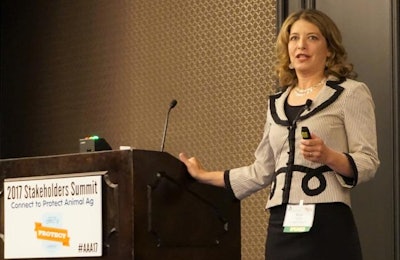
Eggs and bacon get a bad rap they don’t deserve. Nina Teicholz, an investigative journalist turned best-selling author, says dietary recommendations damning animal fats deserve the dustbin.
On May 3, Teicholz shared the main points of her 2014 book, “The Big Fat Surprise: Why Butter, Meat and Cheese Belong in a Healthy Diet” as part of the Animal Agriculture Alliance Stakeholders Summit in Kansas City, Missouri. The author said she spent more than a decade tracking down the story and was surprised at how defensive the health and nutrition community was about her work to find out what she called the truth about saturated fats.
Bad science
According to Teicholz, saturated fats coming from dairy and meat are not the dietary demons they are made out to be. Since ancient times, dairy and meat products have been a key part of the human diet around the world. In the past few decades, propelled by official dietary recommendations, people started to move away from traditional foods to lower-fat alternatives.
This, Teicholz said, can be traced back to the 1950s when the nation took a sudden interest in heart disease after President Dwight Eisenhower suffered a serious heart attack in 1955. The medical community was curious as to why heart disease was increasing steadily and one physiologist, Dr. Ancel Keys, developed a hypothesis that dietary saturated fat is the root cause of heart disease.
Through the force of his personality – Teicholz said his own friends described him as arrogant and a bully – Keys pushed through his concept and influenced others in the scientific community to follow his way of thinking. By 1961, his hypothesis became policy as the American Heart Association (AHA) began to advise limiting saturated fats and cholesterol in order to prevent heart disease.
Over the next decades, Keys and his close associates gained a tremendous amount of influence over the health community and the politics of nutrition science, with their influence extending to the AHA and the National Institutes of Health. Eventually, Teicholz said, his work played a role of the formation of the U.S. Department of Agriculture’s nutritional guidelines and the 1992 debut of the “food pyramid” concept placing carbohydrates at the foundation of a healthy diet and telling consumers to eat fats sparingly.
The problem with this, Teicholz said, was that studies conducted over the years to test Keys’ hypothesis are tantamount to scientific fraud. Numerous studies were conducted with one result in mind, she said, and data was routinely cherry-picked to lead to one conclusion. Several studies conducted on highly controlled populations – where every aspect of the subject’s diet was controlled over a long period of time – showed that there was no correlation between saturated fats and cardiovascular disease. The results that went against the theory were simply ignored, she said.
Low-carb instead of low-fat
Between 1965 and 2011, American consumption of saturated fats fell by 17 percent and overall fat consumption fell by 25 percent. Over the same period, carbohydrate consumption increased by 30 percent. During this time, obesity rates skyrocketed. Teicholz said it’s likely these two trends are linked.
The real culprit for American corpulence could be the carb, she said. According to the carbohydrate-insulin hypothesis, carbohydrates are broken down as glucose – simple sugar – in the body, resulting in a spiked insulin level. More insulin in the body leads to problems like obesity and type 2 diabetes. Someone who’s eaten a meal rich in carbohydrates is more likely to feel hungry than someone who’s eaten a protein- or fat-heavy meal. Due to the feeling of fullness they create, people are also less likely to overeat proteins and fats than carbohydrate-laden foods.
Teicholz said more than 74 trials of low-carb diets – with at least 32 lasting more than six weeks – establish that low-carb diets are safe and can work to fight obesity, diabetes and heart disease while lowering cardiovascular disease risk factors. She cited one man’s blog, “Butter Makes Your Pants Fall Off,” as evidence of how fatty foods can actually aid in weight loss.
What the science says now
Despite the knowledge that the science is not solid, the belief that fat should be avoided is still prevalent. Teicholz said this could be because, over decades, many powerful and well-heeled parties – including those in government and medicine who had poured decades of resources into promoting the theory – simply do not want to admit they were wrong, or they have too much to lose financially if consumers shifted their eating habits.
There are some changes in the medical community, however. Teicholz said the Heart and Stroke Foundation of Canada – Canada’s version of the AHA – has officially removed its thresholds or limits for saturated fat in the diet.
She shared four things that current science says about saturated fats:
- Saturated fats do not cause cardiovascular death. Numerous studies examining the link between saturated fats and heart disease show that saturated fats are not associated with heart disease and that saturated fats have no effect on cardiovascular mortality.
- Eating cholesterol does not worsen blood cholesterol. Instead, saturated fats have also been shown to raise HDL (high-density lipoprotein) or “good” cholesterol.
- A low fat diet doesn’t work. Again, numerous studies show that low-fat diets cannot be shown to be effective at fighting obesity, diabetes, heart disease or any kind of cancer. A low-fat diet is associated with decreasing HDL and increasing triglycerides, which are both signs of an increased risk of heart disease.
- Eating fat doesn’t make you fat or cause cancer. Teicholz cited 2004 and 2007 studies showing fat consumption is not linked to obesity or cancer.


















